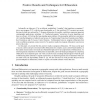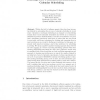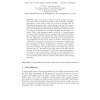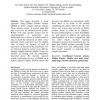1414 search results - page 276 / 283 » Randomness and Universal Machines |
EUROCRYPT
2004
Springer
14 years 3 months ago
2004
Springer
Informally, an obfuscator O is an efficient, probabilistic “compiler” that transforms a program P into a new program O(P) with the same functionality as P, but such that O(P)...
PATAT
2004
Springer
14 years 3 months ago
2004
Springer
Abstract. Within the field of software agents, there has been increasing interest in automating the process of calendar scheduling in recent years. Calendar (or meeting) schedulin...
SBIA
2004
Springer
14 years 3 months ago
2004
Springer
Abstract. Most of the work in machine learning assume that examples are generated at random according to some stationary probability distribution. In this work we study the problem...
HICSS
2003
IEEE
14 years 3 months ago
2003
IEEE
This paper describes a novel approach using Hidden Markov Models (HMM) to detect complex Internet attacks. These attacks consist of several steps that may occur over an extended pe...
AUSAI
2003
Springer
14 years 3 months ago
2003
Springer
An important task in machine learning is determining which learning algorithm works best for a given data set. When the amount of data is small the same data needs to be used repea...




